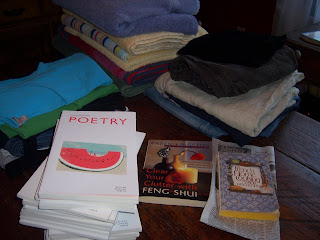I devised the strategy of “Piles” last week as a way to inspire me to begin the annual routine of ‘clearing out clutter’ from the house which is a task I am well overdue for doing this year. Instead of the usual plan of going from room to room to clean out drawers and shelves and closets and such, I decided to jolt myself into it by trickery. I said, “OK, I am uninspired – so I will tiptoe into the thing by the strategy of piles. Wherever there is a pile in any room,” I said aloud to myself as I moved from the kitchen table where I have been equally uninspired to write these past few weeks, “I will work through that pile.” That is, I would dismantle it, shuffle through it, purge it, file it, memorize it, or trash it. I would confront the stagnant energy that sits there on piles – unread newspaper articles, clippings of things I want to do or places I want to go, scribbled ideas to write about, books and magazines I intend to read, recipes I mean to try, warranties to be mailed, and user’s manuals to be figured out. But it wasn’t just paper piles weighing me down, I soon found out, but piles of clothes that ought to be mended or ironed or done away with altogether – piles of stuff.
I began to understand Piles as I shuffled through its energy and smelled its mustiness, saw its ghosty offspring (dust balls) scuttle away under beds and heard their flat, stale cries. We were not so different after all – they too had lost their fizzle, their inspiration, and their drive. Piles are prostrate things; they have no humph; they prefer corners or shadowy hideaways, never the limelight . . . their only job is to take up space and gather dust unto themselves. Dust is the embodiment of procrastination . . . and dust will beget more dust . . .
It’s a wonderful thing to shuffle through old energy and make it stand upright – whether in a file cabinet or between bookends or on a wall – it becomes revitalized that way. I want to stand upright too, I thought. And I love tossing things into a trash can that I no longer need – like cleansing the mind of obligations and leaving open space for new ideas to come in. There were piles of recipes that had been limiting me while presiding on the kitchen table where I write – Prince William’s chocolate biscuit cake, real lemon curd, and tea cookies. “The wedding is over,” I said, and tossed them in the trash. Some promising recipes I filed away in a drawer to be forgotten and perhaps cleaned out next year; at least they are no longer on the kitchen table where their stagnant energy becomes nagging energy every time I sit down to write – pulling at me and draining me.
I thought the job of dismantling piles might be done in an hour or two, but it took the better part of Memorial Day weekend. I had been inspired. My trickery had worked – not only were the piles disrupted, but the books on shelves were sorted, the drawers purged, the closets stirred around and given light, the vitamin cabinet reorganized, the refrigerator and freezer cleaned out, and the birdbaths washed and refilled. Clothes were thrown into category piles for either donation, or washing, or tossing. Karen Kingston, the author of at least two feng shui books which I like so well, writes in her monthly e-newsletter, http://www.spaceclearing.com/html/blog/ that we wear only 20 percent of the clothing we keep. An honest assessment of my own closet and drawers proves her right.
There was one persistent pile, however, that held more energy than the rest; it protested loudly each time I moved it – to the floor near the trash can, to the floor near the recyclables, to the floor near the donations – nothing seemed right. It was my pile of mostly unread "Poetry" magazines which I had habitually stacked up since early 2009. I kept waiting for the perfect quiet evening to read them with diligence and focus, to digest them. But that perfect evening (without tiredness) never came. Having saved the best for last, they had soured. So I carried them back to the room where I read, spread them out on the floor, shuffled them, stirred them, made them go out of order – and then left them that way, on the floor to breathe, for the rest of the day. That night, Memorial Day Monday night, I cracked them open, one at a time – not reading every word, but selectively perusing them for the things I liked. It was the third-to-the-last book I picked up (the July/August 2009 issue) that made my holiday weekend of cleaning and bustle all worthwhile – in it, a poem called, “Poet as Housewife” by Elizabeth Eybers, translated from the Afrikaans by Jacquelyn Pope:
Always a broom leaned against a wall,
meals never on time, if they come at all.
Days without dates through which she moves
empty and stubborn, slightly confused.
Ironing hung dejectedly over a chair,
gestures that come from who-knows-where.
Old letters unanswered, piled together,
papers and pills stuffed deep in a drawer.
Thankful to be part of your heart's great whole
yet devoted to the limits of her own small skull.
O orderly biped, take heed,
leave her alone -- let her read.


No comments:
Post a Comment